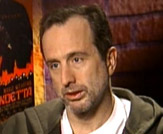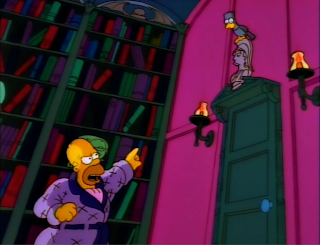Dir. James McTeigue
Starring John Cusack, Luke Evans, Brendan Gleeson, and apparently M. Emmet Walsh is in there somewhere too.
 |
I wish I could say THE RAVEN is a piece of shit. If it were, it might almost be interesting. As it is, it’s just a giant tease, a clever idea with some inspired elements which doesn’t even seem to care enough to be memorably awful. It just sits there, treading water, occasionally glancing at its watch until its 111 minutes are up and it can slink away.
And
that’s a damn shame, because you and I both know there’s a fucking
awesome movie to be made out of this concept. Edgar Allan Poe --maybe
the most romantically tortured of all the great masters of the English
language-- is a character who has little been explored on the big
screen, and due to the miserable details of his life and the brilliantly
dark nature of his work, all but screams for a story which plumbs the
depths of his misery and reveals what went on in the mind of a man who
had endured so much and imagined so richly and darkly. His work is
both literal enough to cull concrete meaning from and ambiguous
enough that we could imagine all kinds of likely scenarios as to what
inspired him and what it meant, particularly given that biographical
detail on Poe is notoriously sparse and clouded with misinformation,
rumor, speculation, and legends. And you can add in the genuinely
mysterious and colorful details of his death (found incoherent in the
streets of Baltimore, wearing mysterious clothing and rambling about an
unknown person named “Reynolds” before succumbing to an unexplained
death) which generate a special layer of lugubrious mystery to a
man who was already a darkly compelling riddle. His life alone is
interesting enough to justify a whole trilogy of films, but if you’re
gonna throw a serial killer mystery into it I’m not gonna complain. It
might be gilding the lily, but you can’t deny that it could work -- It
fits perfectly into Poe’s literary output (he was, after all, the father of detective fiction!), and could work as a nifty
foil to externalize Poe’s own inner darkness.
 |
| Seriously, how is a movie with a poster this badass not amazing? |
But
for reasons unknown, director James McTeigue and writers Ben Livingston
and Hannah Shakespeare chose to make a movie with Poe in it that is not
actually about Poe, and is instead about a bunch of half-baked serial
killer cliches vaguely based on some inconsequential details of Poe’s
writing*. It lends credence to the idea that there’s really just one Mad
Libs-style serial killer script floating around Hollywood, and from
time to time people just pick it up and fill in the nouns and verbs.
Honestly, I wouldn’t be at all surprised to learn that, PUMKINHEAD 2-style, some producer acquired the rights to make a movie about Poe and
just had some jerk write his name into a pre-existing script so they
could make it before the rights expired. Perfunctory doesn’t even begin
to describe it; sleepwalking comes somewhat closer.
Literally
nothing interesting in the premise is properly explored, and most isn’t
even touched on. Instead, the name of the game is Edgar Allen Poe:
action hero. Poe’s young, hot, blonde, feisty, rich, articulate, fiance (?) gets
kidnapped by one of those tiresome serial killer who want to play a cat
and mouse game with our hero, and Edgar rides horses, fires guns, blows
things up, knocks down walls, punches through doors, and chases suspects
across shaky rafters to get her back. Shit, it might as well be a
19th-century adaptation of Donkey Kong.
 | |
| Stark Raven Mad. |
And the damndest shame of it is, there are some frustrating promising
elements here. Cusack is an inspired choice for Poe, easily evoking his
slightly doughy, childlike face and deeply tired eyes. He’s not so great
with the half-assed olde-tyme dialogue, but he’s definitely working
hard, courageously taking a few of Poe’s freakouts to epic mega-acting levels in a vain attempt to distract you into thinking you care.The
production design is gorgeous, really impressively conjuring a
believable and expansive world for the characters to inhabit. It’s
immaculately lit, amiably scored, and features a decent cast. Brendan
Gleeson seems glumly resigned to the fact that he has nothing at all to
do in this story except be the one other recognizable cast member so
you’ll suspect it was him, but hey, he’ll never be bad in his life. And
Luke Evans, who has done an impressive 13 movies in the past 2 years
without me noticing him in any of them, really stands out as Detective
Exposition. Seriously, he’s at least as pointless and maybe more
pointless than the rest of the characters in the cast, but he really
puts his all into the role and consequently you perk up slightly
whenever he comes around. Combine all that with a few nice lamp-lit
scenes of corpses, a dusting of historical trivia, and a couple clever
deaths and this one should have been impossible to bungle.
And yet, bungled it is. McTeigue and his screenwriters studiously focus on all the wrong things, emphasize all
the stupidest aspects of the story, and piss away all the obvious
strengths they have working for them. It’s a mystery where the clues are
meaningless and arbitrary. A police procedural without any credible
detective work. A horror film without any scares. An action film without
any action. And the only intriguing thing in the whole mess -- Poe
himself -- barely factors in. McTeigue can’t seem to get it
through his head that this is not a kinetic chase film -- it’s a moody,
period horror piece. So every once in a while, out of the blue, there
will be some ridiculous jarring stylistic flourish, like Poe suddenly
dodging a gunshot in bullet time or the killer leaping off a building
and slicing someone up with a knife like a ninja. Making these things
self-consciously stylish doesn’t make them more exciting, it just serves
to illustrate how painfully pedestrian they are, while at the same time
immediately and catastrophically expunging any amount of atmosphere the
film’s superb production design has torturously managed to work up. If
the film has a spiritual parallel in shittiness, it’s got to be Tim
Burton’s heartbreaking SLEEPY HOLLOW, another gorgeous production which
seems for all the world to mistakenly believe that what we want from our
eerie, nightmarish horror films is small-scale action scenes,
explosions, and cheeky one-liners. At least RAVEN has the decency to be
consistently dismal.
 |
| Wait guys, major brainstorm happening here. What if, instead of "Quoth the Raven: Nevermore," we change it to: "Quoth the Raven: Fuck you and Die!" |
Ultimately, what the film forgets is that Poe, for all his clever mystery plots, was about much more than set pieces. The poem version of the The Raven is one of the most truly horrifying works of art ever not because it’s gruesome or bloody or filled with monsters and sadistic killers -- but because it plumbs the depths of our imagination and respects that what we find there is infinitely more horrifying than a lot of CG blood. It’s about despair, loss, and the arbitrary cruelty of a world which would give you the capability to love so powerfully, only to twist those feelings into wrenching, neverending pain. It was Poe’s understanding of the abyss within mankind that made his works classic, not his clever murderous gimmicks.
That necessary fact is completely lost on the filmmakers here, who fail to understand something even as simple and cinematic as The Pit and The Pendulum.
Yes, we see that setup recreated here, but here’s the problem: The
pendulum drops about four inches every swing, so we see the guy
screaming, see the thing cut into him, and in about 30 seconds of screen
time he’s sliced in half in a admittedly somewhat satisfying display of
CG gore.** The entire point of the story was the sadism of waiting,
waiting, waiting as your death gets slowly, inexorably nearer. But
McTeigue and company clamber in like excited teenagers about to get laid
for the first time and predictably fail to see that the point is not to
cut to the finale, but rather to savor the character of the experience. Like the film itself, the sequence gamely gathers the right ingredients, but forgets to cook them into a meal, instead just dumping them in your lap and then staring at you expectantly. It stands to reason, then, that
the film’s one truly chilling bit is Cusack giving a really excellent
reading of the last verse of the titular poem. Even without the rest of
the poem’s context, Poe’s words and Cusack’s desolate reading provoke
and unsettle us more than some cheeseball murder plot ever could.
 |
| Still the best Poe adaptation I know of. |
*Just how inconsequential? The first clue the police find that the work is related to Poe is that a seemingly locked room actually has a spring release on a window. Which is a worthwhile detail in the original Murders in the Rue Morgue only because the culprit is actually an ape, capable of getting out the window onto the roof (spoiler: that’s not the case here, because that would actually be interesting). That’s it, that’s the only connection. Another tenuous link? One of the guys the killer murders is just a random sailor, killed in an unimaginative way, who happened to be sailing on a ship called the Fortunado (the name of the victim in A Cask of Amontillado). Seriously, that’s the only connection. You call those taunting clues? Put down the Cliff’s Notes and read a real book, you lazy philistine. What a pathetic excuse for a murderous psycho.
**By the way, the guy who gets sliced up is Rufus Griswold, who in real life published an unflattering and patently untrue biography of Poe in an effort to slander him after he died. His biography colored peoples’ perceptions of Poe for years afterwords, but unexpectedly ended up up having the effect of helping cement Poe as a pop art fixture due to its sensational description of his (mostly fictional) debauchment. Now, Poe is revered as a literary genius and Griswold is mentioned only as body count in a third-rate serial killer flick. Now that’s a poetic twist worthy of Poe himself.
No comments:
Post a Comment